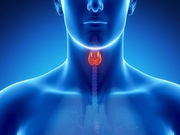Patients on combination therapy have increased risk of thyroid dysfunction and hypophysitis
THURSDAY, Sept. 28, 2017 (HealthDay News) — Patients receiving immune checkpoint inhibitor (ICI) regimens may experience endocrine dysfunction, with increased risk of thyroid dysfunction and hypophysitis for patients on combination therapy, according to a review published online Sept. 28 in JAMA Oncology.
Romualdo Barroso-Sousa, M.D., Ph.D., from the Dana-Farber Cancer Institute in Boston, and colleagues examined endocrine adverse events using data from 38 randomized clinical trials assessing use of ICIs for advanced solid tumors, with 7,551 patients eligible for meta-analysis. The regimens were categorized as monotherapy with a programmed cell death protein 1 (PD-1) inhibitor, a cytotoxic T-lymphocyte-associated protein 4 (CTLA-4) inhibitor, a programmed cell death 1 ligand 1 (PD-L1) inhibitor, and combination therapy with PD-1 plus CTLA-4 inhibitors.
The researchers found that patients receiving combination therapy had the highest incidence of both hypothyroidism and hyperthyroidism. Compared with patients on ipilimumab, patients on the combination regimen were significantly more likely to experience hypothyroidism and hyperthyroidism (odds ratios, 3.81 and 4.27). A significantly greater risk of hyperthyroidism but not hypothyroidism was seen with PD-1 versus PD-L1 inhibitors (odds ratio, 5.36). Patients receiving PD-1 inhibitors were less likely that those receiving ipilimumab to experience hypophysitis (odds ratio, 0.29), while the likelihood was increased for those who received combination therapy (odds ratio, 2.2).
“Our study provides more precise data on the incidence of endocrine dysfunctions among patients receiving ICI regimens,” the authors write.
Several authors disclosed financial ties to the pharmaceutical industry.
Abstract/Full Text (subscription or payment may be required)
Copyright © 2017 HealthDay. All rights reserved.








